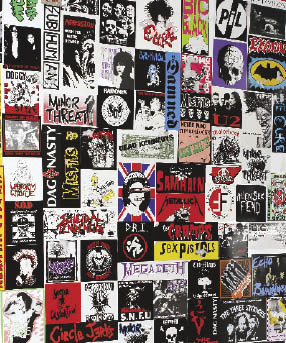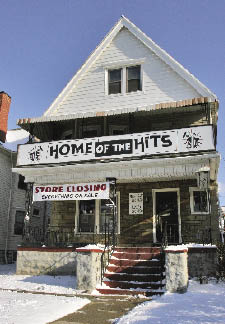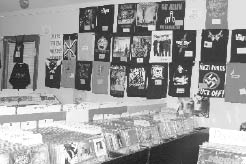Next story: Letters to Artvoice
The Day the Music Died
by Donny Kutzbach

The famous quote about pioneering 1960s band the Velvet Underground is that while few people heard their early records, everyone who did went out and started a band.
Here in the Queen City, a fitting analog to this is that Home of the Hits never sold as many records as Record Theater, Media Play and Cavages (or any other record chain that’s come and gone), but the music bought there made a massive impact not only on the people who bought it but also on the music scene here in Buffalo.
For almost a quarter of a century, this modest store has transcended retail to become something of a local institution. Now, sadly, the iconic record store that traded in garage, punk, metal, psychedelic, avant-garde, indie, electronic, power pop and just about everything in between is closing its doors.
Here I am, lamenting to sing the sad goodbye ballad of Home of the Hits.

The store grew out of Play It Again Sam’s, a local head shop begun in the mid 1970s that eventually expanded to multiple locations. The shop stocked and rented LPs alongside its vast quantity of incense, black-light posters and the like. Jennifer Flynn Preston dropped out of college to run the store that her brother had started. Her brother was a rock-and-roll junkie who hated the fact that the people he employed showed little to no excitement for music. She took the reins and began focusing heavily on the store’s record side.
By 1982, Preston’s brother sold her the Elmwood location and she changed the name to Home of the Hits, a dubious moniker at best.
Bill “Farside” Wickam, a longtime customer and former employee, recalls the story behind the name.
“Jennifer used to say her only regret was naming the store after the Modern Lovers’ Beserkley record label ‘Home of the Hits,’ as the store contained very few ‘hits’—much to the dismay of confused first-time patrons wandering down Elmwood for a solid 25 years,” he says.
It didn’t need to be about hits.

From the back room of 1105 Elmwood, Preston quietly helped shape the tastes of Buffalo’s left-of-center music-buying public, one record at a time. Her contribution to the local scene has long gone unheralded. While her constant attention to stocking the latest, greatest and often otherwise unavailable music solidified the store’s reputation, it was Home of the Hits’ environment that made it a hub.
If you needed to hang a show flier, Home of the Hits was the best place to do it. It was the only place to buy band t-shirts and hair dye in the time before the lame and tame Hot Topic-ization of America. It was a place to be seen, simply the coolest place in the city to hang out.
Through the years plenty of famous names passed through the creaky, monstrous wooden door of the mid-20th-century home converted to a storefront.
U2 pored over the aisles of albums in their early days. Chrissie Hynde once bought a Ramones design from its famed t-shirt-lined walls. Henry Rollins went on a CD-shopping spree during a snowstorm. Vincent Gallo used to spend hours on end there just hanging out.

Before retiring to raise his kids, Eric (EVR) Van Rysdam manned the register and helped Preston run Home of the Hits for 15 years. A veritable wellspring of musical knowledge, Van Rysdam can endlessly espouse on rock minutiae but sometimes obvious things slip past him.
“I was talking to this guy for a while, having a great conversation selling him some CDs before realizing the name on his credit card was Benjamin Folds,” Van Rysdam says. “What was special about Home of the Hits was always way beyond moments like that. It was the regular customers who were so happy to be here. They made it easy for me to stay here so long.”
For 24 years, Home of the Hits has been the kind of place where you’d not only buy your records but, more importantly, you’d connect with people who felt the same way you did. Call it passion.
Be it a customer or an employee, you were likely to look across the bins at someone who you could feverishly discourse about Steely Dan, the Stooges, the Smiths or Slayer. Sometimes all of those bands in one conversation!
Hillary Roe hooked up with more than a stack of CDs at Home of the Hits.
The Niche Narrows
The closing of Home of the Hits is a very sad, sentimental event for many music fans in the Buffalo area, but it’s also symptomatic of a growing trend among independent record stores everywhere. The challenges presented to mom-and-pop music retailers—in the form of file sharing, downloading and perhaps most notably the ability of big-box stores like Wal-Mart, Target and Best Buy to identify music as a loss leader and sell CDs at a price point below what independent stores can offer—mean that survival for independents favors those who can adapt.
When asked about the closing, Govindan Kartha—owner of New World Record, located about seven blocks down Elmwood from Home of the Hits—is far from gloating. “It’s bad. I’m not happy about it. This is not what I’m looking for—I want the big boxes to go away. I want the indie stores to survive. And though Jennifer and I are technically competitors, we’ve always had a collegial sort of relationship. I’m really sorry to have that store close.”
But the challenges are many, and Kartha understands this. “Truthfully, we’re pinched on every front. The record companies would love to sell directly to consumers and that is their end goal, or endgame—to avoid the middleman. The consumer doesn’t really want to pay for music anymore. The culture has moved away from valuing music as a commodity or as something that’s worth paying for. I think that both Home of the Hits and we have survived a little better because we’re not counting on volume sales of Billboard type hits. We’ve always appealed to fairly serious music fans and that shrinking minority that does want to have a tangible physical archive—a physical piece of art. Meaning the CD, the packaging, the liner notes. Something better than a ripped CD, or an mp3 file. But there are a lot of people for whom it doesn’t matter. The general culture has moved away from that.”
Then there’s the price of CDs. “The prices are too damn high,” says Kartha. “A few years ago, Universal Music dropped list prices from $18 and $19 down to $13.99. I went to a national meeting and they acted like this would be a great breakthrough for independents. But you know what? We survive on CDs. We can’t sell them for twenty cents above cost. Best Buy can do it because they sell refrigerators and plasma TVs. They’re not looking to make money on CDs. The reality is even if we could sell CDs for $9.99, the big box stores will knock it down to $5.99 just to bring people through the door.”
If you look at statistics provided by the Recording Industry Association of America (RIAA), the percentages do seem to tell a story. In 1994, record stores (and this would include large chains like the recently defunct Tower Records, a business failure that will eventually cause the loss of jobs for around 3,000 Tower employees) sold 53.3 percent of all records. In that year, 26.7 percent of all records were sold at other stores. Record and tape clubs accounted for 15.1 percent, and TV, newspaper and magazine ads or 800 numbers moved 3.4 percent. There were no numbers then for Internet sales. In 2004, only 32.5 percent of all records were sold in record stores—a drop of over 20 percent—while other stores accounted for 53.8 percent—a gain of 27.1 percent. Since 2004, the statistics show an increasing percentage of records being purchased via digital download.
Eric Levin is the owner of Criminal Records—an independent record store in Atlanta, Georgia—and also president of the Alliance of Independent Media Stores (AIMS). Levin knows the challenges facing independent record stores, but he advocates embracing change and growing in ways that cater to the desires of his clientele. “It is really quite simple, and I don’t mean to sound arrogant when I say this, you are either working towards the future and making the necessary changes to make your store the best it can possibly be, or you aren’t. There are lots of businesses that quit trying and they fail because they quit trying. Criminal Records started in 1989 as a record store and comic book store that carried vinyl and cassettes. Now it’s all of that, plus a coffee shop, magazine stand, book store, toy store and art gallery.” In other words, find other ways to put money in the cash register besides selling records.
Still, Kartha suggests another trend: “We’re starting to see people who pulled away for a while. They loved buying music, but they started having families and other responsibilities, and now they are starting to come back with their kids. And they’re also interested in what get called heritage artists who have been around for years and years but are still doing great work. In an amazing way it’s really cool that you can have a Johnny Cash album, or a Nina Simone album be in my top 10. Fortunately for us, Best Buy doesn’t give a damn about a Tom Waits box set, you know? And we blow through a ton of those before Best Buy even knows they exist.”
—buck quigley
“My main memory is meeting my husband Robert for the first time in Home of the Hits,” Roe says. “We had been talking on the phone for awhile and he was in town and decided to meet up and Home of the Hits seemed like the perfect place.”
Greg Gizzi, noted local drummer and chef, says the magic of the store was behind the counter.
“I enjoyed the unique personalities of the employees the most,” Gizzi insists. “Over my 20-plus years of patronizing Home of the Hits, my musical tastes were always recognized by the staff. I would find discs personally ordered for me, sometimes unprompted. I would always dig the music!”
In days long before Pitchfork.com’s sharp record geek humor, dutiful vinyl-buying customer Tyler Harrington remembers one inspired employee gag.
“They posted a fake flier once that said: ‘Wanted! One-armed drummer needed for Def Leppard Tribute Band F-F-F-FOOLIN’—doesn’t matter if you’re righty or lefty. No poseurs!’” Harrington recalls. “It was complete with the tear-away phone numbers. Classic.”
Perhaps the unique brand of customer service Home of the Hits has offered customers simply fell out of favor with the times, the way the milkman did. Gizzi sees a more specific cause: “If video killed the radio star, then the Internet killed the record store,” he says.
Home of the Hits survived the flurry of changes in the music industry in years running the store. The 1980s saw the switching of favor from vinyl LPs to cassettes and a brief ban on import recordings, while the 1990s meant an exodus from cassette to compact discs. Preston sees the last decade’s technological boom of CD burning along with file sharing and downloading as a fight she could never win.
“You can’t beat free,” Preston says. “Free is fun and easy. Bottom line is that people can find just about anything and download, in most cases for free. People have just stopped buying CDs.”
The city’s incredible shrinking size, particularly in the 20- to 40-year-old age bracket, has also added to the burden.
“People have been emailing me asking what happened and saying they always come in every time they’re in town. I explain, ‘That’s what happened: You don’t live here.’ Thousands and thousands have left the city and that has hurt, too.”
Though the Internet has opened up music in making it easily attainable and cheap or free, it has taken something away, too. There isn’t the same kind of passion in getting new music. Clicking a computer desktop folder of song files is never going to be as exciting as looking at an album sleeve. Skipping through songs on an iPod will never offer the long-term satisfaction and appreciation of listening to a record all the way through. Furthermore, the interaction is gone.
“For the generations that grow up with the Internet, the cultural importance of places like this will be hard to grasp,” insists Bill Wickam. “Home of the Hits closing is the Buffalo equivalent of New York City losing CBGB’s. It’s been Jen’s labor of love for years, but love doesn’t pay the bills.”
Preston sees the closing of the store as something she is doing on her own terms. She has always made the store about selling music, owing the last few year’s largest percentage to used CD sales, and was reluctant to water down the idea of a being a cool record store.
“I could have tried to do a bunch of changes to reinvent things like adding video rental or selling toys and gifts, but that was never why I got into this,” she says. “That’s not what this store is about.”
There is a chance that fabled store could continue. Preston would like to sell the store, the building and the stock to someone who might carry it on. While the closing of the store is indicative of declining retail sales of recorded music, many in the music industry believe that the last man standing in the brick-and-mortar music retail game will be the boutique shops like Home of the Hits that specialize in niche recordings, rarified stuff and vinyl.
“I’m not convinced that this store can’t still make it,” she says with some optimism. “If I was in my 20s I could easily live on what I make here. At my age, however, I just can’t anymore.”
She has spoken to some interested parties but, for now, has discounted everything for a going-out-of-business sale and plans to close the store permanently by January, on what is sure to be a cold day in this city.
Retelling the story, from my journalistic standpoint, feels a lot like what I’d imagine it would be to have to write the obituary of one of my best friends.
As is the case with most of the people in the story, I fell in love with music over and over again at Home of the Hits. Sometimes I never even saw it coming.
As a kid, I saved my hard-earned, suburban teenage dollars for the few and too far between trips to buy t-shirts and music there. In my 20s, I was lucky enough to spend a few years as an employee where I’d end up handing back most of my check at the end of the week in exchange for import CDs and weird vinyl. I still insist it’s the best job I ever had.
Some of my most cherished relationships, be they with the friends I hold dear or slabs of vinyl that I’ve worn out the grooves on, were forged at Home of the Hits. It wasn’t just me.
Preston is in her back office among posters of Neil Young, Patti Smith and the Jam, and she’s holding back tears. When the news of Home of the Hits’ closing started to spread last week, there began an outpouring of phone calls, emails and message board posts from all over. Customers and friends were telling her how much the store has meant to them and how, extraordinarily, a record store helped shape their lives.
“I was thinking that I failed,” she says, “but apparently I didn’t. I thought nobody gave a shit but I was totally wrong. That’s the only reason I’m remotely happy now.”
|
Issue Navigation> Issue Index > v5n49: The Day the Music Died (12/7/06) > The Day the Music Died This Week's Issue • Artvoice Daily • Artvoice TV • Events Calendar • Classifieds |









 Current Issue
Current Issue